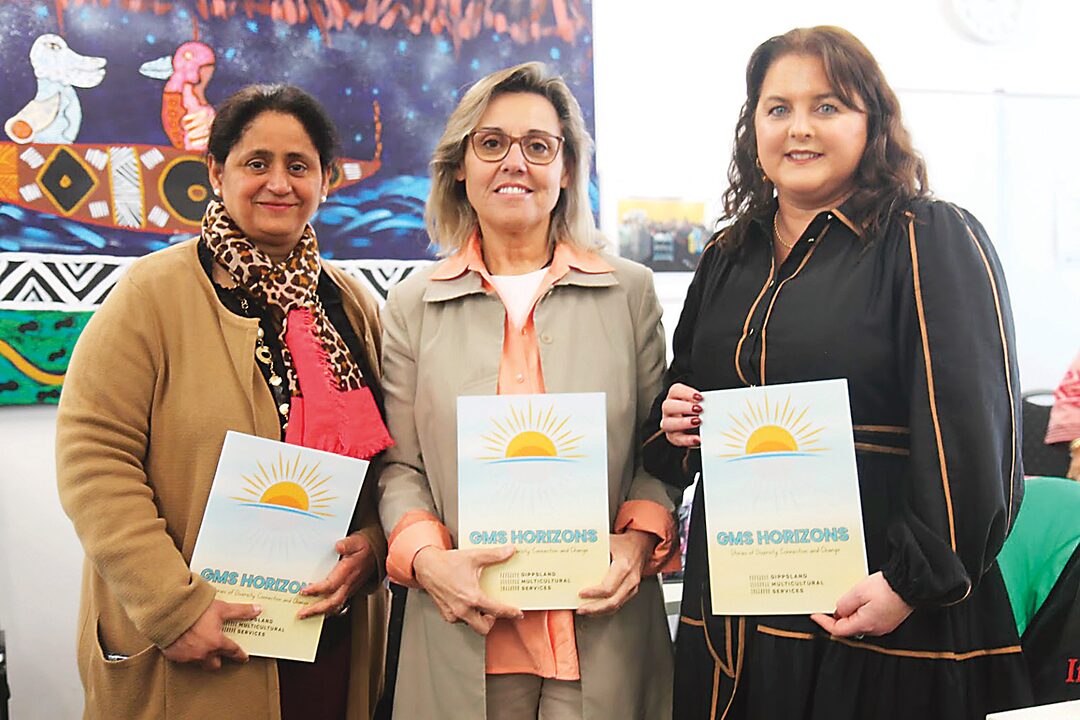By KATRINA BRANDON
CAPTURING the stories of many individuals with diverse backgrounds in the community, Gippsland Multicultural Services Inc (GMS) and Gippsland Multicultural Regional Emergency Management Network has released a book on the journey’s locals have taken to get to where they are today.
The book, GMS Horizons: Stories of Diversity, Connection, and Change, was compiled by 16 local contributors from diverse backgrounds.
GMS plays a vital role in promoting multiculturalism, fostering social connections, and enhancing service delivery across the Gippsland region.
Surrounded by community and friends, GMS launched the book, accompanied by a welcome from the recently appointed chief executive of the Settlement Council of Australia, Maria Dimopoulos.
Ms Dimopoulos had been in her position for eight weeks, during which time she had been visiting multicultural communities around the country, with the exception of Queensland.
During the event, Ms Dimopoulos shared her own journey and experiences as someone who was once new to the country. Hailing from Greece, Ms Dimopoulos moved to Geelong with her family when she was eight-years-old, where she experienced diversity for the first time.
“I came to Australia when I was about eight and my brother was six. (We) literally did not know a word of English,” she said.
“(We) got dropped into a primary school, where we didn’t know what was going on, and my mother had given my brother and me a pillow because in Greece, at lunch, you would sleep. We were then sent home with a note saying, ‘Your children are very lazy.’
“What it did was it really highlighted to me that, sadly, cultural differences back then were not terribly well understood, that there were a lot of assumptions that were made about a practice like most of Greece.”
Besides the misunderstanding between the two lunch times, Ms Dimopoulos said she would often find herself the subject of racism due to her ethnic background. Ms Dimopoulos said these experiences shaped her commitment to human rights, believing that everybody should live their lives with dignity and respect.
Since then, Ms Dimopoulos has gained experience working with the United Nations High Commissioner for Refugees (UNHCR), the Department of Foreign Affairs and Trade, and with many diverse communities, both locally and overseas.
Now, she is on a mission.

“We’ve got some work to do, there’s no doubt about that,” she told the group.
“But I also see incredible examples of communities that are doing the most innovative things in local and regional communities like this one.
“I love what settlement services do for our communities, because I absolutely believe that if we can get settlement right, if we can invest the right amount of support and services for newly arrived communities in a way that I didn’t get … in a way that my parents didn’t get … then we actually get better outcomes.
“My message to the government is, if you invest in settlement services, you invest in long-term social cohesion. You invest in communities that feel like they are part of the broader Australian community. So I put my hand up because I love the settlement sector, because I love our multicultural communities.”
Reminiscing about a moment her mum experienced, Ms Dimopoulos highlighted that multicultural Australia is everyone in Australia, not just some, as on some level, there was a point where most families moved to the country that we now share.
She also recognised the work of her colleagues and the Minister for Multicultural Affairs, Dr Anne Aly, as well as Mark Groote from the Department of Human Affairs Head Office for Social Cohesion.
In Ms Dimopoulos’ speech, she mentioned a poster the UNHCR produced about refugees.
“There’s a great UNHCR poster, and the poster is this young man and a graffiti on a wall that says, ‘Go back to where you came from’. And he says, ‘I would if I could’, because refugees don’t leave willingly. Refugees are forced to leave because the situation is so unsafe for them and their families.”
“We talk now about a trauma-informed response. I think that has been a really important part. We understand that perhaps we need to invest through that lens of trauma-informed care; we need to invest more time in supporting people through their journey of integration.”
Taking the stage, Ms Gafa shared the story of the years behind GMS, acknowledging more than 40 years of work advocating for multicultural communities in the Gippsland region.
“In recent years, when I started at GMS, the focus and funding were almost solely on aged care, which is a vital and core part of our business,” she explained.
“I’ve continued to grow this and prepare our organisation and staff to ensure we meet all quality requirements under the aged care reforms. We have now successfully obtained NDIS accreditation, enabling us to expand.
“Our support workers are now a skilled team of both long-term, experienced support workers and recruits trained in dementia, mental health, first aid, the importance of trauma, informed care and cultural awareness, delivering high-quality, person-centred, and trauma-informed care.”
For more information on the Gippsland Multicultural Services, go to: https://www.gms.org.au/












